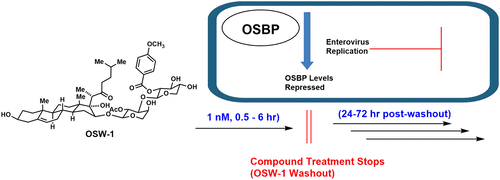当前位置:
X-MOL 学术
›
ACS Chem. Biol.
›
论文详情
Our official English website, www.x-mol.net, welcomes your feedback! (Note: you will need to create a separate account there.)
Transient Compound Treatment Induces a Multigenerational Reduction of Oxysterol-Binding Protein (OSBP) Levels and Prophylactic Antiviral Activity.
ACS Chemical Biology ( IF 4 ) Pub Date : 2019-01-11 , DOI: 10.1021/acschembio.8b00984 Brett L Roberts 1 , Zachary C Severance 1 , Ryan C Bensen 1 , Anh T Le 1 , Naga Rama Kothapalli 1 , Juan I Nuñez 1 , Hongyan Ma 1 , Si Wu 1 , Shawna J Standke 1 , Zhibo Yang 1 , William J Reddig 2 , Earl L Blewett 2 , Anthony W G Burgett 1
ACS Chemical Biology ( IF 4 ) Pub Date : 2019-01-11 , DOI: 10.1021/acschembio.8b00984 Brett L Roberts 1 , Zachary C Severance 1 , Ryan C Bensen 1 , Anh T Le 1 , Naga Rama Kothapalli 1 , Juan I Nuñez 1 , Hongyan Ma 1 , Si Wu 1 , Shawna J Standke 1 , Zhibo Yang 1 , William J Reddig 2 , Earl L Blewett 2 , Anthony W G Burgett 1
Affiliation

|
Oxysterol-binding protein (OSBP) is a lipid transport and regulatory protein required for the replication of Enterovirus genus viruses, which includes many significant human pathogens. Short-term exposure (i.e., 1-6 h) to a low dose (i.e., 1 nM) of the natural product compound OSW-1 induces a reduction of cellular OSBP levels by ∼90% in multiple different cell lines with no measurable cytotoxicity, defect in cellular proliferation, or global proteome reduction. Interestingly, the reduction of OSBP levels persists multiple days after the low-dose, transient OSW-1 compound treatment is ended and the intracellular OSW-1 compound levels drop to undetectable levels. The reduction in OSBP levels is inherited in multiple generations of cells that are propagated after the OSW-1 compound treatment is stopped. The enduring multiday, multigenerational reduction of OSBP levels triggered by the OSW-1 compound is not due to proteasome degradation of OSBP or due to a reduction in OSBP mRNA levels. OSW-1 compound treatment induces transient autophagy in cells, but blocking autophagy does not rescue OSBP levels. Although the specific cellular mechanism of long-term OSBP repression is not yet identified, these results clearly show the existence of an OSBP specific cellular regulation process that is triggered upon treatment with an OSBP-binding compound. The stable reduction of OSBP levels upon short-term, transient OSW-1 compound treatment will be a powerful tool to understand OSBP regulation and cellular function. Additionally, the persistent reduction in OSBP levels triggered by the transient OSW-1 compound treatment substantially reduces viral replication in treated cells. Therefore, the long-term, compound-induced reduction of OSBP in cells presents a new route to broad spectrum anti- Enterovirus activity, including as a novel route to antiviral prophylactic treatment through small molecule targeting a human host protein.
中文翻译:

瞬态化合物处理可诱导多代减少氧固醇结合蛋白(OSBP)的水平和预防性抗病毒活性。
氧固醇结合蛋白(OSBP)是复制肠道病毒属病毒(包括许多重要的人类病原体)所需的脂质运输和调节蛋白。低剂量(即1 nM)天然产物化合物OSW-1的短期暴露(即1-6小时)可在多种可测量的细胞系中诱导细胞OSBP降低约90%,且无可测的细胞毒性,细胞增殖缺陷或整体蛋白质组减少。有趣的是,低剂量,短暂的OSW-1化合物治疗结束且细胞内OSW-1化合物水平降至不可检测的水平后,OSBP水平的降低持续数天。OSBP-1化合物治疗停止后,在多代细胞中遗传了OSBP水平的降低。持续多日 由OSW-1化合物触发的OSBP水平的多代降低不是由于OSBP的蛋白酶体降解或由于OSBP mRNA水平的降低。OSW-1化合物处理可诱导细胞发生瞬时自噬,但阻断自噬不能拯救OSBP水平。尽管尚未确定长期OSBP抑制的特定细胞机制,但这些结果清楚地表明了OSBP特异性细胞调节过程的存在,该过程在用OSBP结合化合物治疗后触发。短期,短暂OSW-1化合物治疗后OSBP水平的稳定降低将成为了解OSBP调节和细胞功能的有力工具。另外,由瞬时OSW-1化合物处理触发的OSBP水平的持续降低大大减少了在处理过的细胞中的病毒复制。
更新日期:2018-12-21
中文翻译:

瞬态化合物处理可诱导多代减少氧固醇结合蛋白(OSBP)的水平和预防性抗病毒活性。
氧固醇结合蛋白(OSBP)是复制肠道病毒属病毒(包括许多重要的人类病原体)所需的脂质运输和调节蛋白。低剂量(即1 nM)天然产物化合物OSW-1的短期暴露(即1-6小时)可在多种可测量的细胞系中诱导细胞OSBP降低约90%,且无可测的细胞毒性,细胞增殖缺陷或整体蛋白质组减少。有趣的是,低剂量,短暂的OSW-1化合物治疗结束且细胞内OSW-1化合物水平降至不可检测的水平后,OSBP水平的降低持续数天。OSBP-1化合物治疗停止后,在多代细胞中遗传了OSBP水平的降低。持续多日 由OSW-1化合物触发的OSBP水平的多代降低不是由于OSBP的蛋白酶体降解或由于OSBP mRNA水平的降低。OSW-1化合物处理可诱导细胞发生瞬时自噬,但阻断自噬不能拯救OSBP水平。尽管尚未确定长期OSBP抑制的特定细胞机制,但这些结果清楚地表明了OSBP特异性细胞调节过程的存在,该过程在用OSBP结合化合物治疗后触发。短期,短暂OSW-1化合物治疗后OSBP水平的稳定降低将成为了解OSBP调节和细胞功能的有力工具。另外,由瞬时OSW-1化合物处理触发的OSBP水平的持续降低大大减少了在处理过的细胞中的病毒复制。


























 京公网安备 11010802027423号
京公网安备 11010802027423号